Space… the final frontier. Sorry, I just always wanted to start a story with that and figured this was the time.
When I was recently invited down to Las Vegas to learn about Boeing’s CST-100 and Bigelow Aerospace’s BA-330 space habitat, I lit up. I love space and, even more so, commercial space. This is the area of space where maybe someday an average Joe might be able to experience what it is like to be up in the heavens. Until then, it will take companies and individuals with money to get commercial space off the ground (literally).
The International Space Station is currently expected to have a useful lifespan until about 2020. Firms like Bigelow Aerospace are looking at ways to provide a commercial space habitat to nations and companies who are willing (and able) to pay. Although they have tried a few variants, they are putting quite a bit of effort into the BA-330 Space Habitat (no, it is not related to the Airbus A330).
It is one thing to see drawings of what the BA-330 will look like, versus having a full mock-up. And that is exactly what Bigelow had at their facility in Las Vegas – a true, life-sized version of the BA-330, and I was lucky enough to get a look inside.
No kidding, walking into the BA-330 felt like I was walking into the future. It could have been the fancy LED lighting, or imagining a team of astronauts taking care of business, it was rather cool.
The first thing (after the lighting) I noticed was how most of all the equipment that astronauts would access are located in the middle of the structure. Unlike the ISS, which has most things on the outside, this provides greater living space between the center core and the outer walls.
Although much of the equipment would be located in the center, supplies (i.e. food/water) can be attached to the outer walls.
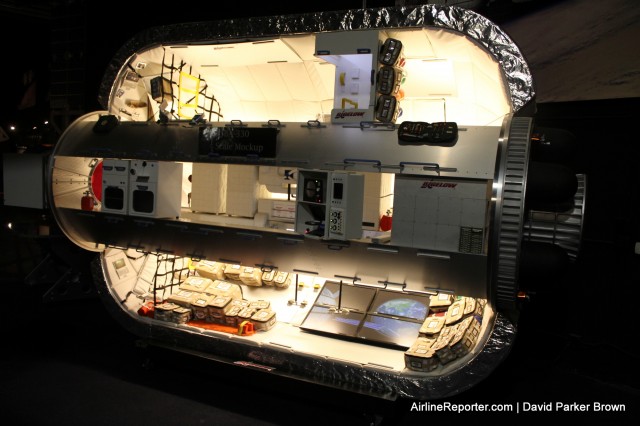
The mock up shows how much of the infrastructure of the BA-330 is in the middle, with living space around the outside
It was hard to think in space terms. As in, “how would I get up to that structure way up top?” On the ground, I have to take a ladder, but in space it would be an easy exercise of just pushing off a ledge.
One possible challenge presented was the fact that the additional space could cause problems with astronauts getting stuck. There is enough room that one could be where they could not touch any surfaces, and if they were stopped, they would be stuck. You would obviously want to make friends with the others on board to make sure they could come rescue you.
An aspect that makes the BA-330 quite cool is its ability to expand. This allows it to be a smaller piece of cargo to be sent to space in a rocket and then expand in space to 12,000 cubic feet (or 330 cubic meters – where the name comes from).
The BA-330 is able to house six crew members in relative comfort. On one side of the habitat are the separate bedrooms with bed, storage, and computer attached to the wall.
Located in the center upper (well, is there really “upper” in space?) section is a zero-g toilet. It doesn’t look to provide the best privacy ever, but it is designed to get the job done.
Interested? You can start setting up your reservations now. It will cost about $25 million to have access to 110 cubic meters (1/3 of the BA-330) of space over a two month period. This does not include getting to the station, which will cost about another $26-37 million per seat.
No one ever said that space travel was cheap right? For countries or large companies around the world looking to conduct space testing, this actually becomes quite affordable.
There is also the option to name the first space station made of two BA-330s. The current name is planned to be “Alpha Station,” and that is pretty boring. For $25 million per year, you can slap your own name on the station. Or, if you are more on a budget, you can pay $12.5 million just to name one of the BA-330 modules.
Once long ago, flying on an airplane was not common, somewhat dangerous, and an expensive endeavor. Space travel today is more so. However, it is possible that someday, space travel will be much like we fly on a plane today. As there becomes competition in commercial space travel and the desire to go into space grows, this could become more commonplace.
Could you imagine a day where people might complain about a 30-minute delay for their Spacelines flight? Heh. Maybe someday.
Additional Bigelow Aerospace BA-330 Photos
Comments are closed here.
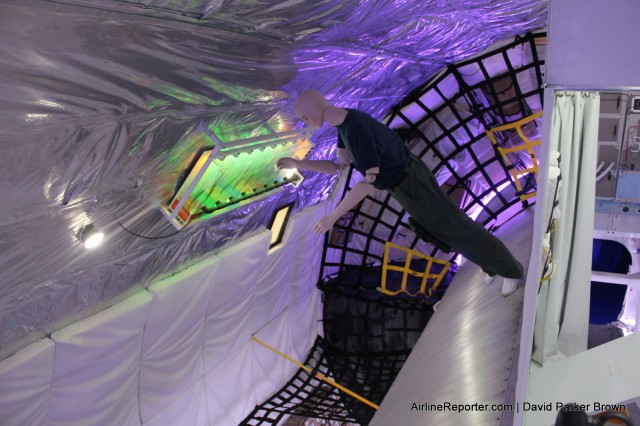
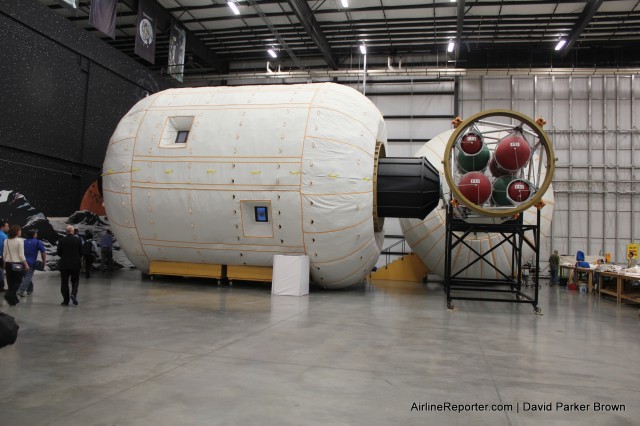

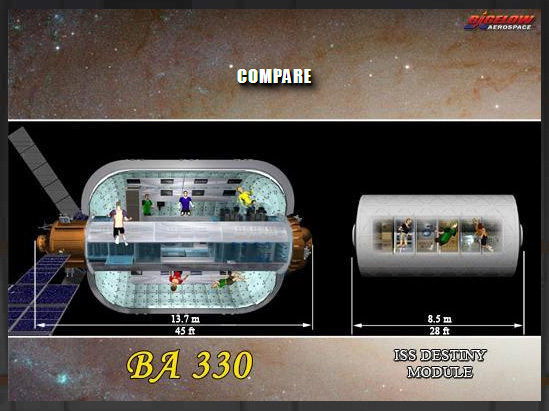
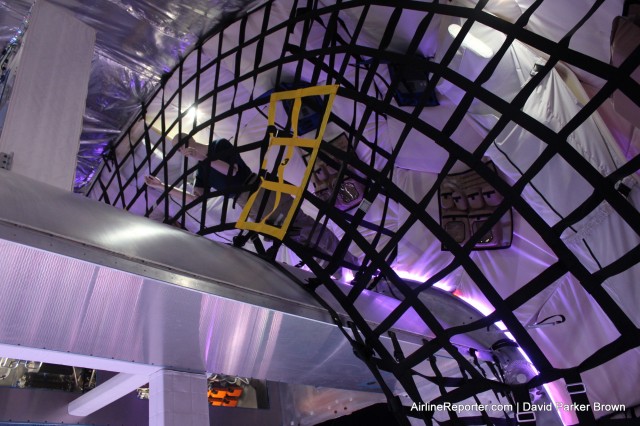
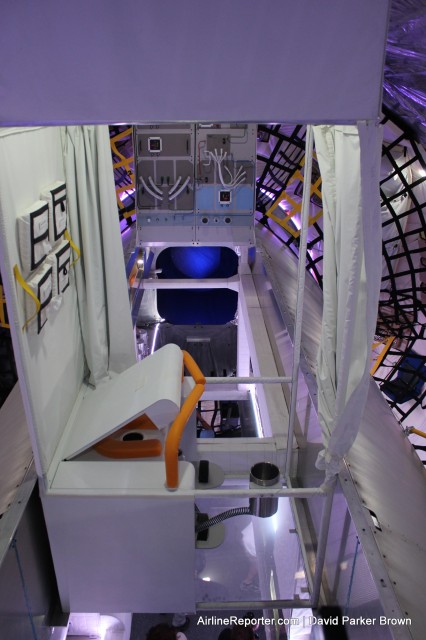
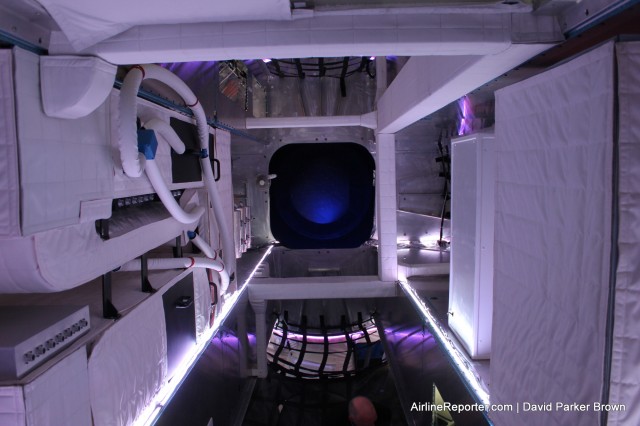
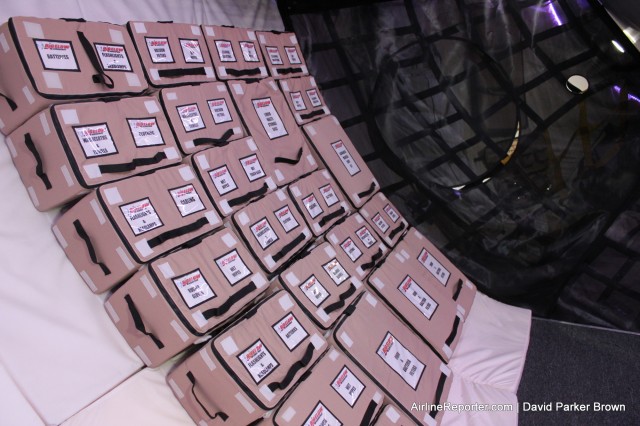
Very impressive space habitat….
…however, I can’t help but remember that these things have been collecting dust since 2005.
Do they give tours of the BA 330 to the general public, or were you able to tour and photograph as a reporter? Do you have any additional information on the module? Inflated wall thickness? Uninflated wall thickness? Seems very interesting.
Ben,
I had media access. Even with that access, I had to go through quite a bit of security. There was a lot of information that BA was still not willing to share about the BA-330.
David, AirlineReporter